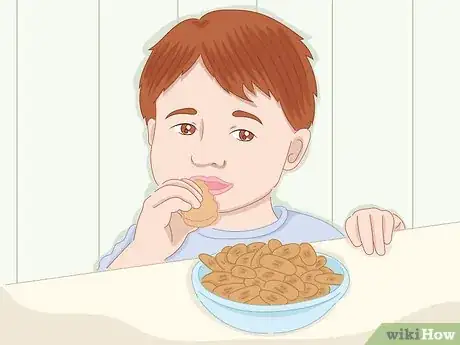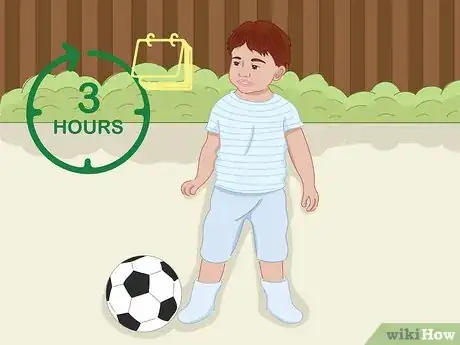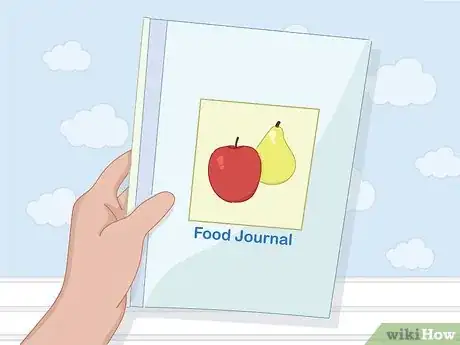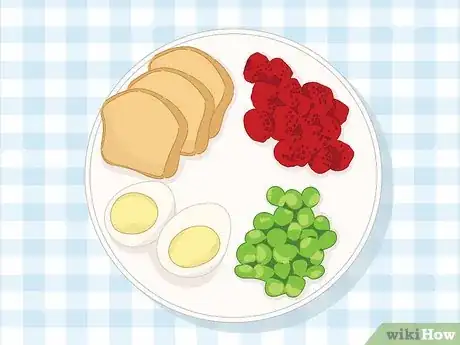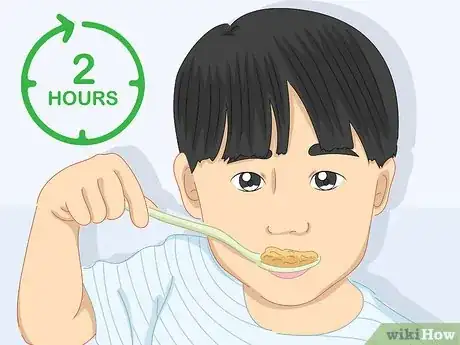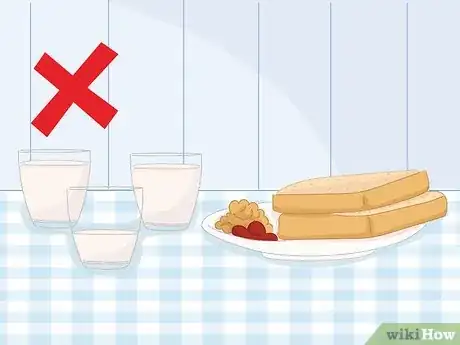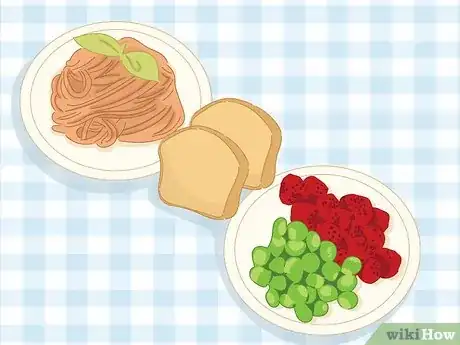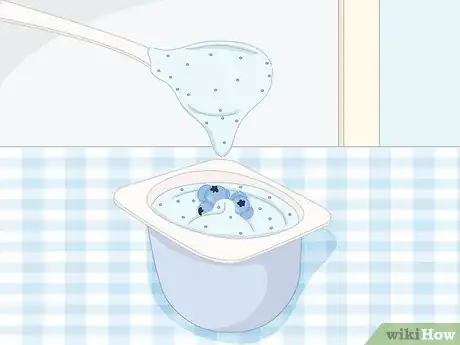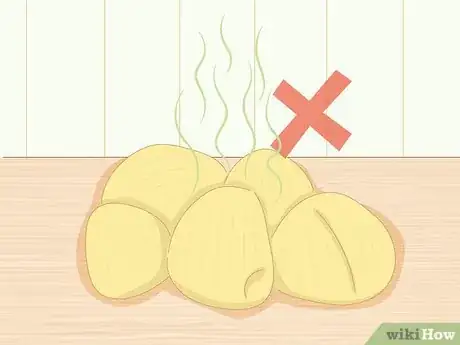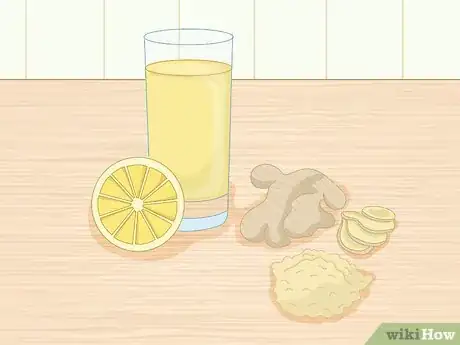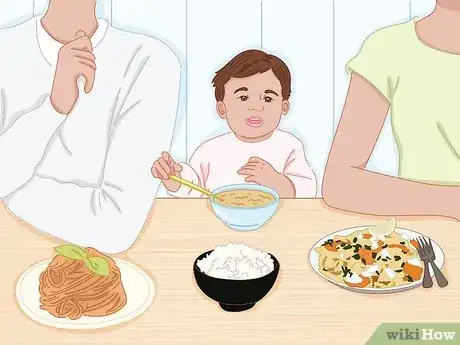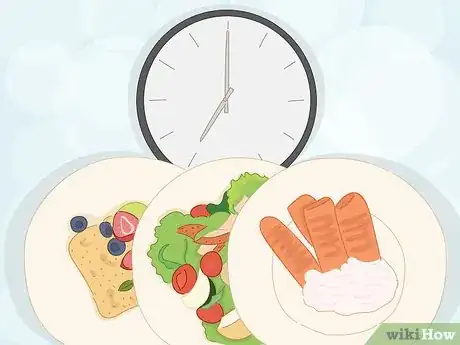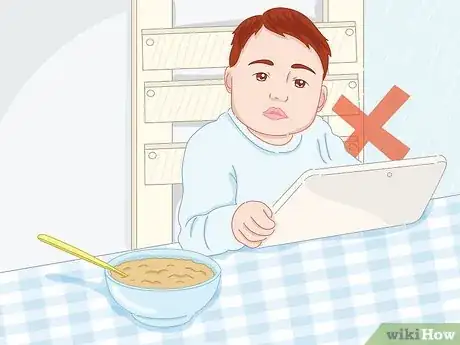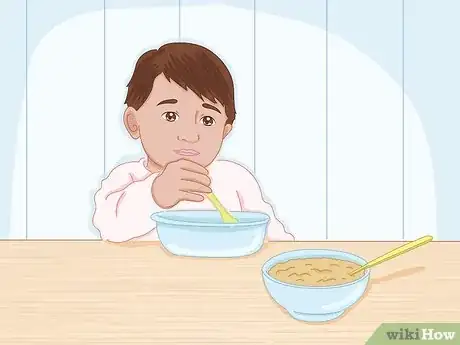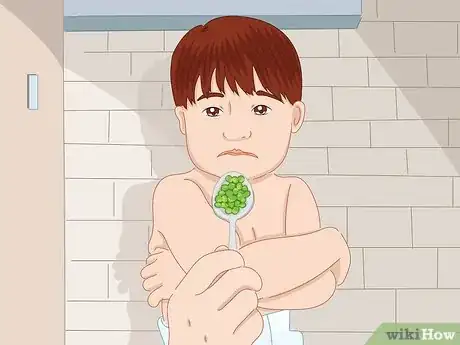This article was co-authored by Amy Chow. Amy Chow is a Registered Dietitian and the Founder of Chow Down Nutrition, a family and child nutrition consulting service in British Columbia (BC), Canada. With over nine years of experience, Amy has a special interest in pediatric nutrition, food allergy management, and eating disorder recovery. Amy holds a Bachelor’s degree in Nutritional Sciences from McGill University. She gained her clinical experiences at residential and outpatient eating disorder treatment programs as well as for BC Children’s Hospital before starting her own business. She has been featured on Find BC Dietitians, Dietitians of Canada, Food Allergy Canada, Recovery Care Collective, Parentology, Save on Foods, National Eating Disorder Information Centre (NEDIC), and Joytv.
There are 11 references cited in this article, which can be found at the bottom of the page.
This article has been viewed 24,715 times.
It can be very unnerving when your toddler experiences a decrease in appetite. However, this is very common as they reach a certain age. As they begin to grow, the outside world becomes far more fascinating, and the fresh plate of food sitting in front of them can seem less and less appealing. It may take some trial and error, but by finding the cause of your toddler’s loss of appetite, changing their habits around food, varying their meals, and creating consistency around mealtimes, you can get your toddler back to their normal eating habits.
Steps
Finding the Cause of Appetite Loss
-
1Notice if your toddler is in between growth spurts. Toddlers do not grow as quickly as they did when they were babies. When toddlers are not experiencing a surge in growth, they will require less food throughout the day, in turn, causing a decrease in appetite. This is normal and nothing to be concerned about.[1]
- Appetite varies greatly with growth spurts; if your child is acting happy and healthy, then there is more-than-likely no reason to be concerned. Continue to monitor your toddler’s habits to help you determine periods of time when they are experiencing growth spurts.[2]
-
2Acknowledge that your toddler may be exploring their independence. As toddlers begin to feel more confident in the world, they want to assert their independence. This can often manifest through their eating habits. One day they may completely clean their plate and the next not want to take a single bite.[3]
- Allow your toddler to explore their independence. This is completely normal, and your toddler will eat when they feel hungry.[4]
Advertisement -
3Make sure your toddler is getting at least 3 hours of exercise daily. When your toddler is not burning enough energy, they do not need to replenish themselves as frequently.[5] Try engaging your toddler in more physical activities and have playtime outside.[6]
- Give your toddler at least 10-15 minutes notice before a meal so that they can settle down before eating.[7]
- It is suggested to allow your child to get at least 3 hours of playtime outside per day.
-
4Recognize when your toddler is feeling ill. Most of the time your toddler’s lack of interest in food will be due to normal growth and development. However, if your child is experiencing symptoms such as a rash, fever, or a sore throat, they may not be eating because they are unwell.[8]
- If your child’s symptoms do not improve within a few days or you are worried that they seem unwell, or undernourished consult your child’s primary care doctor.[9]
-
5Keep a food journal to monitor your toddler’s habits. This is a great way to not only track changes in their eating habits but to also determine the foods that your toddler loves and those that may need to be avoided in the future.[10]
- Staying on top of your toddler’s appetite changes can help you determine if this change is consistent or if something else is going on, such as an illness.
- Consistently keeping a food journal will also help you plan for the days when your toddler seems distracted or uninterested in their meals. It will help you recognize the foods they enjoy on a regular basis so you can have them on hand.[11]
Changing Feeding Habits Throughout the Day
-
1Ensure your toddler is eating a well-balanced breakfast. It is important that your child is starting the day off right by receiving a healthy, nourishing breakfast. For toddlers, a healthy breakfast not only boosts their metabolism and increases appetite, but also provides the nourishment they need to gear up for the day.
- Provide a well-rounded breakfast that contains whole grain, protein, and a fruit or vegetable.[12]
-
2Feed your toddler every 2-3 hours to improve their digestive system.[13] If your child gets fussy over meals and is having 3 meals a day, try feeding them every 2 hours. Your child may be hard to please during mealtimes because their digestive system isn’t active enough to make them feel hungry.[14]
- Allow snack-time to be its own meal by replacing sugary fillers with hardy substitutes. Rather than reaching for the cookie jar, give your toddler a sandwich or a bowl of whole grain cereal.[15]
-
3Make water your toddler’s go-to drink throughout the day. Water should not only be the first beverage your child has in the morning, but it should be their main drink throughout the day and 30 minutes before meals. Allowing them to drink milk or sugary juices may cause them to feel full, decreasing their appetite around mealtimes.[16]
- If you do allow your toddler to drink juice, try to ensure that it is 100% fruit juice and limit them to a maximum of 6 fluid ounces (0.75 c) a day.[17]
-
4Do not allow milk to be its own meal. Milk is often used as a snack and can act as a filler. If your toddler is allowed too much milk, especially close to mealtimes, they may experience a decrease in appetite.[18]
- Decrease the amount of milk your toddler has when it gets closer to their time to eat. Without that extra filler in their day, their appetite should return.
- Try introducing other types of dairy such as yogurt and cottage cheese. These will allow your child to still get their needed dose of calcium, without causing them to get too full.
Making Adjustments to Your Toddler’s Diet
-
1Vary your child’s daily menu. It can be easy to fall into the same routine when you find foods your toddler loves to eat. It is important to mix up the menu to ensure they are getting all of the key nutrients they need. Add new foods in slowly and know they may reject it on the first try.[19]
- Make sure to vary each meal with a mixture of new and familiar foods. If they seem hesitant of new food at first, that is okay. They may change their mind the next day, or it could be something that just doesn’t taste good to them.[20]
- Opt for whole grain products such as slices of bread and pasta that will provide your toddler with lots of iron, folic acid, and B vitamins. Use dairy products like milk and yogurt for servings of calcium, vitamin D, and proteins. Make sure also to provide your child with lots of fruits and vegetables, cut into kid-friendly sizes.[21]
- Make sure to include lean meats such as poultry and fish for a healthy serving of necessary proteins, fats, and vitamins.[22]
-
2Give yogurt a regular place in your toddler's diet. Yogurt is full of calcium and healthy probiotics that your child’s body needs to help build their immune system. The nutrients found in yogurt do wonders when helping boost a child’s appetite.
- Vary the way you serve yogurt to your toddler. Use yogurt as a healthy snack or a delicious dessert with pieces of fruit.
-
3Use a dash of appetite-boosting herbs and spices in your child’s food. Adding spices such as cinnamon, oregano, and fennel will aid in increasing your toddler’s appetite. These herbs and spices all have flavors that are subtle enough that your toddler may not even notice.[23]
- Make sure the spices and herbs are not too visible in their food, as highly visible garnishes may deter your child from eating it.
-
4Avoid foods that have very strong smells. Children can be susceptible to heavy odors and tastes. If you find yourself cooking with particularly smelly foods, try to forego any recipes that call for those ingredients for a while. There is a good chance that your child has been reacting to these tastes and smells and will begin eating normally once they are eliminated.[24]
- Foods such as garlic, carry a strong odor and taste, which may be deterring your child from eating foods that contain it.
-
5Increase your toddler’s zinc intake. Zinc can naturally help build your child’s appetite. Certain nuts, such as cashews and pumpkin seeds are great sources of zinc that your child will love. Try to include these in your child’s meals and snacks to increase their daily intake of zinc.
- If your child does not like foods that are high in zinc, ask your doctor about getting zinc supplements.
-
6Make your own juice to improve your child’s digestive system. Certain juices such as lemon and ginger can help detoxify your child’s digestive system. They can also help by calming nausea and indigestion, which may be the reason your child is refusing to eat. Juicing can help keep your toddler healthy by increasing their immune system and calming many possible stomach problems.[25]
- Stronger remedies, such as garlic juice may be unappealing to kids because of the harsh flavor. For ginger, in particular, try mixing together 2 spoonfuls of ginger juice, 3 spoonfuls of lemon juice, and 2 spoonfuls of honey. Have your child drink this mixture first thing in the morning on an empty stomach.[26]
Creating Positive and Consistent Mealtimes
-
1Keep mealtimes fun and enjoyable. Try to create an environment where mealtimes are a happy, social occasion with your family. Allowing your toddler to see you and others enjoying meals can influence them to enjoy their food too.[27] Also, avoid negative conversations at the dinner table, as it can affect your child’s digestion.
- Toddlers are incredibly social, and as much as they want to show their new independence, they want to feel included within their family. Having a happy, family meal will also cause your child to associate that time, spot, and activity with positive thoughts.
- To ensure you are creating a good environment for your toddler, avoid discussing any stressful topics during meals. Keep the conversation to a lighter tone and talk about happier things to help increase your toddler’s appetite.[28]
-
2Have meals, especially dinner, at a consistent time.[29] Making your meals fall in the same time frame daily will help your toddler adjust to a routine and know what to expect. As unstructured as toddlers may seem at times, they thrive with regularity. It is also important to ensure that younger children are not eating too late in the day.
- For children under 10 years old, it is recommended that they have at least 3 hours between their last meal and their bedtime. This will ensure that their meal is being digested properly, which will encourage a healthy appetite in the morning.
-
3Remove any possible distractions during mealtimes. As toddlers become interested in the world around them, they can become easily distracted. Often this can result in little interest towards the meal in front of them.[30]
- Do not feed your toddler with the television playing loudly in the background.[31] This and other distractions such as books and toys can cause your toddler to quickly lose interest in their meal.
-
4Allow toddlers to determine their portions, within reason. As your toddler fights for independence, it is important to allow them to make their own decisions, when it is safe to do so. Often toddlers will refuse to eat newly introduced foods or even change their minds on foods they enjoyed before.
- Your toddler might also be getting portions that are too big for them causing them to feel full before they can clear their plate.
-
5Never force your child to eat or punish them for not eating. There are many different reasons your child may have a lack of appetite, but forcing or punishing them will not make the situation any better. It can potentially make it worse by creating anxiety around meals.[32]
Expert Q&A
-
QuestionHow can I increase my baby's appetite?
 Amy ChowAmy Chow is a Registered Dietitian and the Founder of Chow Down Nutrition, a family and child nutrition consulting service in British Columbia (BC), Canada. With over nine years of experience, Amy has a special interest in pediatric nutrition, food allergy management, and eating disorder recovery. Amy holds a Bachelor’s degree in Nutritional Sciences from McGill University. She gained her clinical experiences at residential and outpatient eating disorder treatment programs as well as for BC Children’s Hospital before starting her own business. She has been featured on Find BC Dietitians, Dietitians of Canada, Food Allergy Canada, Recovery Care Collective, Parentology, Save on Foods, National Eating Disorder Information Centre (NEDIC), and Joytv.
Amy ChowAmy Chow is a Registered Dietitian and the Founder of Chow Down Nutrition, a family and child nutrition consulting service in British Columbia (BC), Canada. With over nine years of experience, Amy has a special interest in pediatric nutrition, food allergy management, and eating disorder recovery. Amy holds a Bachelor’s degree in Nutritional Sciences from McGill University. She gained her clinical experiences at residential and outpatient eating disorder treatment programs as well as for BC Children’s Hospital before starting her own business. She has been featured on Find BC Dietitians, Dietitians of Canada, Food Allergy Canada, Recovery Care Collective, Parentology, Save on Foods, National Eating Disorder Information Centre (NEDIC), and Joytv.
Registered Dietitian Make sure your child's getting enough active movement during the day to stimulate their appetite. You should also avoid giving your child milk or snacks between meals since this could make them less hungry.
Make sure your child's getting enough active movement during the day to stimulate their appetite. You should also avoid giving your child milk or snacks between meals since this could make them less hungry.
References
- ↑ https://raisingchildren.net.au/toddlers/nutrition-fitness/common-concerns/toddler-not-eating
- ↑ https://www.aboutkidshealth.ca/Article?contentid=637&language=English
- ↑ http://raisingchildren.net.au/articles/toddler_not_eating.html
- ↑ http://raisingchildren.net.au/articles/toddler_not_eating.html
- ↑ Amy Chow. Registered Dietitian. Expert Interview. 16 September 2020.
- ↑ https://www.ncbi.nlm.nih.gov/pmc/articles/PMC3474391/
- ↑ https://www.ncbi.nlm.nih.gov/pmc/articles/PMC3474391/
- ↑ https://www.aboutkidshealth.ca/Article?contentid=637&language=English
- ↑ https://www.aboutkidshealth.ca/Article?contentid=637&language=English
- ↑ https://childrensmd.org/browse-by-age-group/toddler-pre-school/picky-eaters-whats-normal-worry/
- ↑ https://childrensmd.org/browse-by-age-group/toddler-pre-school/picky-eaters-whats-normal-worry/
- ↑ http://www.unlockfood.ca/en/Articles/Child-Toddler-Nutrition/Make-a-balanced-breakfast-a-habit-in-your-home.aspx
- ↑ Amy Chow. Registered Dietitian. Expert Interview. 16 September 2020.
- ↑ https://www.aboutkidshealth.ca/Article?contentid=637&language=English
- ↑ https://www.todaysparent.com/toddler/hungry-baby-2/
- ↑ Amy Chow. Registered Dietitian. Expert Interview. 16 September 2020.
- ↑ http://www.unlockfood.ca/en/Articles/Childrens-Nutrition/Cooking-and-Meal-Planning/Sample-Meal-Plan-for-Feeding-Your-Toddler-(Ages-1.aspx
- ↑ Amy Chow. Registered Dietitian. Expert Interview. 16 September 2020.
- ↑ https://www.aboutkidshealth.ca/Article?contentid=637&language=English
- ↑ http://www.unlockfood.ca/en/Articles/Childrens-Nutrition/Cooking-and-Meal-Planning/Sample-Meal-Plan-for-Feeding-Your-Toddler-(Ages-1.aspx
- ↑ https://www.aboutkidshealth.ca/Article?contentid=637&language=English
- ↑ https://www.aboutkidshealth.ca/Article?contentid=637&language=English
- ↑ https://aptparenting.com/appetite-stimulant-for-children
- ↑ https://aptparenting.com/appetite-stimulant-for-children
- ↑ http://www.healthcarewell.com/5-home-remedies-to-boost-appetite-in-kids/
- ↑ http://www.healthcarewell.com/5-home-remedies-to-boost-appetite-in-kids/
- ↑ http://raisingchildren.net.au/articles/toddler_not_eating.html
- ↑ https://www.ncbi.nlm.nih.gov/pmc/articles/PMC3474391/
- ↑ Amy Chow. Registered Dietitian. Expert Interview. 16 September 2020.
- ↑ http://raisingchildren.net.au/articles/toddler_not_eating.html
- ↑ https://www.aboutkidshealth.ca/Article?contentid=637&language=English
- ↑ https://www.aboutkidshealth.ca/Article?contentid=637&language=English

